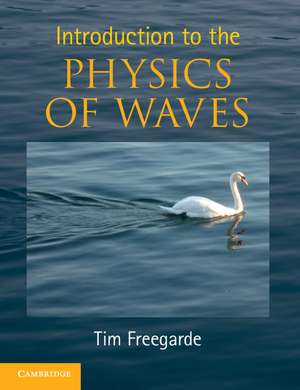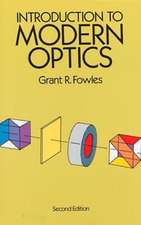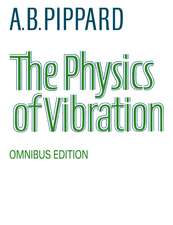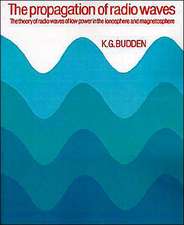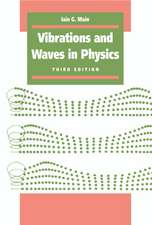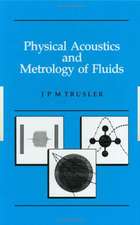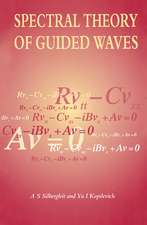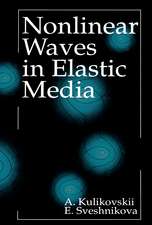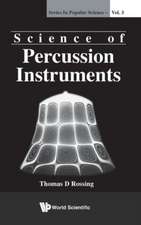Introduction to the Physics of Waves
Autor Tim Freegardeen Limba Engleză Paperback – 7 noi 2012
| Toate formatele și edițiile | Preț | Express |
|---|---|---|
| Paperback (1) | 291.19 lei 43-57 zile | |
| Cambridge University Press – 7 noi 2012 | 291.19 lei 43-57 zile | |
| Hardback (1) | 511.71 lei 43-57 zile | |
| Cambridge University Press – 7 noi 2012 | 511.71 lei 43-57 zile |
Preț: 291.19 lei
Nou
Puncte Express: 437
Preț estimativ în valută:
55.74€ • 60.56$ • 46.85£
55.74€ • 60.56$ • 46.85£
Carte tipărită la comandă
Livrare economică 21 aprilie-05 mai
Preluare comenzi: 021 569.72.76
Specificații
ISBN-13: 9780521147163
ISBN-10: 0521147166
Pagini: 309
Ilustrații: 111 b/w illus. 100 exercises
Dimensiuni: 190 x 245 x 12 mm
Greutate: 0.68 kg
Ediția:New.
Editura: Cambridge University Press
Colecția Cambridge University Press
Locul publicării:Cambridge, United Kingdom
ISBN-10: 0521147166
Pagini: 309
Ilustrații: 111 b/w illus. 100 exercises
Dimensiuni: 190 x 245 x 12 mm
Greutate: 0.68 kg
Ediția:New.
Editura: Cambridge University Press
Colecția Cambridge University Press
Locul publicării:Cambridge, United Kingdom
Cuprins
Preface; 1. The essence of wave motion; 2. Wave equations and their solution; 3. Further wave equations; 4. Sinusoidal waveforms; 5. Complex wavefunctions; 6. Huygens wave propagation; 7. Geometrical optics; 8. Interference; 9. Fraunhofer diffraction; 10. Longitudinal waves; 11. Continuity conditions; 12. Boundary conditions; 13. Linearity and superpositions; 14. Fourier series and transforms; 15. Waves in three dimensions; 16. Operators for wave motions; 17. Uncertainty and quantum mechanics; 18. Waves from moving sources; 19. Radiation from moving charges; Appendix: vector mathematics; Index.
Recenzii
'This gem of a book will enable students to appreciate the core theme: that understanding wave motion is fundamental to almost every contemporary aspect of physics. This is an ideal purchase for undergraduates as it fills a gap left by traditional textbooks treating the same topics in a stereotyped manner which is too mathematical. Freegarde's lucid prose alongside the simple, effective and contemporary examples are noteworthy features. The numerous end-of-chapter exercises will be useful for instructors and students alike.' Ifan G. Hughes, Durham University
'Freegarde's text on waves allows construction of a more cohesive physics curriculum, one with significant 'scaffolding', designed to revisit, reinforce and refine student understanding of core concepts, both within the bounds of this foundational course and, quite naturally, in subsequent courses that follow within the physics major. This stands in contrast to traditional modern physics … with a set of instructional labs consisting of historically entrenched experiments that are largely disconnected from one another. For example, I cannot think of any department which asks its students to do the Millikan oil drop experiment and then later asks them to 'build' upon that in any significant sense. Focused treatment of oscillations and waves allows early development of core formalism necessary for the major, which also lends itself toward supporting a more cohesive set instructional labs, building toward further work in E&M, optics, and quantum mechanics.' Gabe Spalding, Illinois Wesleyan University
'Tim Freegarde is a physicist who is clearly fascinated by waves. His book is an introductory text that covers a broad range of wave phenomena throughout optics, electromagnetism, sound, oceanography and much more. It is written in an engaging style and includes many unexpected topics at this level, such as tsunamis, frayed guitar strings and retarded electromagnetic potentials. Freegarde does not shy away from detailed mathematical treatments where appropriate and physics students who invest in this book early in their undergraduate career will find themselves returning to it on many occasions.' Richard Thompson, Imperial College London
'There are already some excellent textbooks on wave phenomena available, but Freegarde has introduced a helpful new volume that balances brief mathematical derivations with new examples and practical applications. He expanded in a fascinating manner his undergraduate physics lecture notes from the past fifteen years. This book will help students to appreciate that understanding wave motion is fundamental to almost every branch of physics. It covers a broad range of wave phenomena in optics, electromagnetism, sound, quantum mechanics, oceanography and other fields. The exercises at the end of each chapter will be useful for instructors and students alike. I recommend it as a textbook for undergraduate students in the physical sciences.' Reva Garg, Optics and Photonics News
'Freegarde's text on waves allows construction of a more cohesive physics curriculum, one with significant 'scaffolding', designed to revisit, reinforce and refine student understanding of core concepts, both within the bounds of this foundational course and, quite naturally, in subsequent courses that follow within the physics major. This stands in contrast to traditional modern physics … with a set of instructional labs consisting of historically entrenched experiments that are largely disconnected from one another. For example, I cannot think of any department which asks its students to do the Millikan oil drop experiment and then later asks them to 'build' upon that in any significant sense. Focused treatment of oscillations and waves allows early development of core formalism necessary for the major, which also lends itself toward supporting a more cohesive set instructional labs, building toward further work in E&M, optics, and quantum mechanics.' Gabe Spalding, Illinois Wesleyan University
'Tim Freegarde is a physicist who is clearly fascinated by waves. His book is an introductory text that covers a broad range of wave phenomena throughout optics, electromagnetism, sound, oceanography and much more. It is written in an engaging style and includes many unexpected topics at this level, such as tsunamis, frayed guitar strings and retarded electromagnetic potentials. Freegarde does not shy away from detailed mathematical treatments where appropriate and physics students who invest in this book early in their undergraduate career will find themselves returning to it on many occasions.' Richard Thompson, Imperial College London
'There are already some excellent textbooks on wave phenomena available, but Freegarde has introduced a helpful new volume that balances brief mathematical derivations with new examples and practical applications. He expanded in a fascinating manner his undergraduate physics lecture notes from the past fifteen years. This book will help students to appreciate that understanding wave motion is fundamental to almost every branch of physics. It covers a broad range of wave phenomena in optics, electromagnetism, sound, quantum mechanics, oceanography and other fields. The exercises at the end of each chapter will be useful for instructors and students alike. I recommend it as a textbook for undergraduate students in the physical sciences.' Reva Garg, Optics and Photonics News
Notă biografică
Descriere
Balancing concise mathematical analysis with real-world examples and practical applications, to provide a clear and approachable introduction to wave phenomena.
